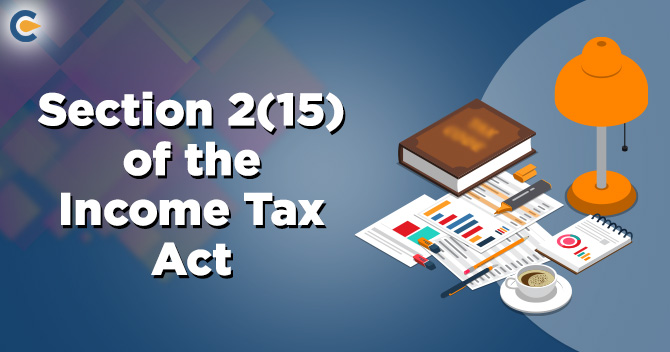Are you concerned with the Standards of your Non-Profit Organization? Okay, let us look upon at most important section 2(15) of the Income Tax Act 1961. Considerably, it defines – the charitable purpose for NGOs. Irrespective of your current location, be it in Maharashtra or Gujarat or Delhi or Assam or anywhere in the Republic of India, this is the only common standard.
Overview on Section 2(15) Under Income Tax Act
- In general, The Income tax act is a dominant piece of legislation whichever state you are in, whether you are a trust, society, or a company. Therefore, let us understand what charitable purpose is under the Income-tax Act defined under Section 2(15).
- It has declared in the Recent Finance Act; that charitable trusts got exempted at large from paying goods and service tax (GST), where the gross revenue exceeds the threshold perimeter of Rs 25 lakh. Moreover, the Charitable purpose under section 2(15) includes these six parameters, which are:- (a) relief of poverty (b) education (c) healthcare (d) environment (e) preservation of monuments and any additional objective of (f) ‘general public utility.’
What do you mean by Charitable Purpose described under Section 2(15)?
By the drawing of Section 2(15) of the Income-tax Act, it defines the charitable purpose of the Act, which comprises relief to the poor, education, medical relief, and the improvement of any other object of general public utility of the Non-Profit Organisation. Given that, charitable purposes under section 2(15) can get categorized under the following heads-


- Consonance with above said, a charitable purpose must be focussed to benefit the community. Moreover, if the primary purposes under section 2(15) of the settler are to help the members of his family and relatives and remotely or incidentally to the general public, in those cases – the Trust is not a ‘charitable’ trust.
- The meaning of the charitable purposes under section 2(15) was inflamed by the Finance Act, 2011 by the accumulation of the following objects in its ambit: a) Preservation of environment which includes watersheds, forests and wildlife, b) Preservation of monuments or places or matters of artistic or historic attentions.
- It was well-defined to include relief to the poor, education, yoga and medical relief, preservation of environment and monuments or places or objects of artistic or historical interest, and the advancement of any other entity of general public utility with effect from the assessment year 2016-17.
Is Promotion of Sports or Games considered a charitable purpose?
At this moment, the promotion of sports and games considered to be a charitable purpose within the connotation of section 2(15) of the Income Tax Act. As a result, association or institution involved in the promotion of sports deserves to be entitled to get the exemption under section 11, if not accepted under section 10(23) of the same.
What do you mean by ‘Advancement of any other Object of General Public Utility’ at all?
- Given the assessment year 2009-10, it duly speaks about the “advancement of any other object of general public utility.” It shall not be a charitable purpose under section 2(15), if it includes the carrying on of any Trust activity in the form of trade, commerce or business, for any means of profit-making or a fee.
- However, this restriction is not applicable if the total income receipts from any activity rendering like trade, commerce or business, does not exceed the limits 15 % of total revenues. Those income receipts shall be of the relevant previous year, enabled from the assessment year 2016-17.
- It will only be applicable if such activity gets undertaken in the course of actual carrying out of such advancement of any other object of general public utility. It should be regardless of the nature of usage or application, or retention, of the income received from such acts of the Trust, as charitable purposes under section 2(15).
What is the Specific Connotation Related to the elements Justifying Charitable Purpose?
- No Indirect Deliveries: – The commercial concern should not be an object of relief of the poor, on the parameters that employs the needy. The purpose must provide relief in a direct form and not indirectly.
- No Wide Ambit- To get the Trust accepted as a charitable trust for exemption, the objects must be specific to authorize to the obligation of income tax law in this respect. In cases where the ambits are too broad, the Trust may not qualify for the said exemption.
- Burden of Proof- In cases of conflict of values, at that moment, the onus to prove that objects are charitable will be on the hands of the assessee.
- No commercial Concern- When the establishment of an industrial or commercial concern visualizes a profit-making action under the purview of Trust, it cannot be said to be a charitable purpose. It cannot get dealt on the ground that it will deliver employment to poor persons as relief in the context of the charitable purposes under section 2(15).
- No Travelling: – The term ‘Education’ means teaching and developing the information, skill, mind, and charismatic character of students by standard schooling. But, in the meanwhile, traveling also enhances knowledge, but then again, that would not qualify as to ‘education’ in the context of Section 2(15) Income Tax Act.
- No Fees for Private Coaching- In the cases where organizations run private coaching institute for teaching, and students to perform at specific examinations after taking fixed fees, is not a charitable purpose of the Trust.
- Sufficient Common Quality: – It would be adequate if the intention to benefit a segment of the public, as notable from a present specified individual. On the other hand, the particular section of the community sought to get profited must be sufficiently well-defined by some common quality of a community or objective nature of the Trust.
- Commercial Trades: – If an institution set up with the object of endorsing trade or commerce, it can be a charitable institution, as it promotes common good over and done with the enhancement of occupational labels. Nonetheless, an institution that regulates the business of its members of the Trust is not a charitable institution at all.
What were the aspects considered by the Charitable Purpose and Charitable Approach under Section 2(15) Income Tax Act?


- Historical Aspect 1922: – The War of basic definition highlights a charitable purpose, rather than actual charity. It led to a peculiar situation, as the then Finance Minister emphasized in his speech that “The process of widening the scope of charitable purpose aided by another doctrine evolved by the courts that it is not a prime element in a charitable purpose. It tells that it should provide something for nothing or less than its cost or less than the regular price”. Which automatically also meant that the charitable element is not essential for charitable purpose!
Result of Historical Aspect: – As a result of this, even broadcasting a newspaper was treated as exempt from income tax. Even a hotel could be requested as exempt under the policy, as it provides shelter and food to tired traveling workers. Therefore, it was thus curtailed for the first time by the 1961 Act, which inserted the famous ten words to the description of charitable purpose –“not involving the carrying on of any activity for profit.”


- Post Historical Aspects 1991: – In the last two decades, three reports have touched upon the taxation of NPOs. This report made a radical recommendation where any NPO which derived more than 15% of its income from sale of goods or services would be treated at par with commercial organizations. Moreover, such NPOs would get taxed like any other business. The reference was, however, not implemented by the Government, until at least 2008.
Results of Post Historical Aspects 2008:-After the several budgets, placed in the Parliament, includes a proposal to tax some of the NPOs which obtain any income from fees, cess, or sale of goods and services. It has done by modifying the definition of ‘charitable purpose’ in section 2(15) to read as below: “charitable purpose” includes relief of the poor, education, medical relief, etc. and the advancement of any other object of general public utility, etc. as said above.
Read our article: Know Everything about President, Secretary and Treasurer of a Trust !
What are the Income Tax Perspectives under Section 2(15), and how it should go all about?
- In the Context of Indian Income Taxation Laws, Trust is measured as charitable if its objects are directed to the benefit of the society visible at large, but not for an individual or group of individuals. More precisely, section 2(15) of the Income Tax Act, 1961[1], defines the expression “charitable purpose.” Moreover, owing to its aim of the social growth of the country, charitable trusts have established favored and preferential treatment in the context of Indian Taxation Laws.
- The Indian taxation of charitable trusts is administered by Chapter III of the Income Tax Act under sections 11, 12, 12A, 12AA, and 13. Section 12A/12Ab covers the provisions regarding the Registration and the Registration Procedure. Furthermore, Section 11 and 12 contain the regulations regarding the conditions to be satisfied by the charitable trusts to claim exemption from paying income tax charges. With this, section 13 specifies the provisions regarding the trusts, which are not qualified to get entitled for exemption u/s 11 & 12 of the same Act.
What is the Exemption for Accumulation of Income in Additional of Specified Limit?
In cases where 85% of income derived from the property of Trust, is not applied for charitable purposes, but is collected or set apart for application for such purposes in India, the exemption can get demanded for the income. It can only get done by accrued or set apart more than 15% limit, only by the fulfillment of the following conditions are submitted with:
- Submit a Statement in form 10B electronically within the time permitted for furnishing the return under section 139(1). It should be notifying the amount accumulated as well as the period of accumulation of the amount. If in case form no. 10B gets not uploaded before this date; at that point, the benefit of accumulation will not be accessible, and such income will be taxable at a suitable rate.
- The concerned period of accumulation should not exceed by five years.
- The money subsequently accumulated should get invested or deposited in modes or forms stated as per under section 11(5).
- Counting from the Financial Year of 2016-17, the benefit of accumulation is not obtainable if the return of income is not well-appointed before due date of filing return as per prescribed rules.
What are the parameters involved in the withdrawal of exemption granted to income accumulated under section 11(2)?
The received income which is accumulated or set apart according to the agreement with the provision of Section 11(2), shall turn into taxable only if-
- Applied to objects other than charitable ones,
- Terminates to remain invested in the indicated forms,
- Not utilized for charitable or religious purposes within the indicated accumulation period or amount,
- Funded or credited to any trust/institution registered u/s12AA or to any fund/organization/trust/college/other educational institution/clinic/any other medical institution mentioned to Section 10(23C) of the Act.
What are New Capital Asset and Fixed Deposits under the Purview of 2(15)?
- The Government says that investment of the net reflection in fixed deposit with a bank for six months or above, would get observed as utilization of the net consideration for the achievement of another capital asset. It has been stated within the meaning of section 11(1A) of the Act
- In the case of ‘CIT vs. East India Charitable Trust (1994) 2016 ITR 152’, the Calcutta High Court has apprehended the view of section 11(5)(vii). It says that all the deposits with public sector companies, shall qualify as a ‘new capital asset’ within the connotation of section 11(1A).
- It is extremely relevant to mention that the ‘charitable trusts’ have an option to either:-
- claim ‘detailed exemption’ u/s 11(1A) concerning to the capital amount, or
- to claim ‘general exemption’ u/s 11(1)(a) by rubbing on to apply at least 85% of the total income counting the sale sold capital assets headed for their charitable purposes.
What are the Recent Amendments incorporated by the Indian Parliament, detailing Mandatory Requirements to establish ‘Charitable Purpose’?
It was truly said by Mr. Chick Grassley that “a trustee is a true Trustee – whose business is to make sure the enforcement of the tax laws and the integrity of the tax code according to the charitable giving.”
- With the occurrences of misuse of reserves by trusts possessed by corporate entities, the Government is constantly tightening the law to take more transparency in the operation of charitable trusts. Certain prominent amendments get combined by the Parliament, in this respects those are listed as under:-
- Charging of income tax at the maximum marginal rate where a charitable trust ceases to exist or converts into a non-charitable entity. It was inserted wef-1/6/2016 under Secs.115 TD to 115TF.
- Mandatory obligation of obtaining PAN for the Trustees,
- Mandatory obligation apply for TDS Deduction,
- Disallowance of Expenditure, Exceeding Rs. 10,000/- in Cash,
- Maximum Perimeter of Cash Donations reduced from Rs. 10,000/- to Rs. 2,000,
- Inclusivity of Power of Survey under section 133A.
Conclusion
The foundation of providing tax incentives and exemptions to charitable trusts is to inspire them to concentrate on public service, but not to collect tax-free prosperity in the mask of social service. The Indian Taxation Laws relating to charitable trusts have gradually progressed over a while. Furthermore, in this regard, the recent amendments as integrated by the Indian Parliament will prevent the exploitation of tax exemptions and recover the tax administration concerning the charitable trusts. Together with this, we at Corpbiz have skilled professionals to help you with the process of claiming Tax Exemptions for your Trust, ensuring the successful and timely completion of your work.
Read our article: Yoga as a Charitable Purpose – Get In-Depth Jurisprudential Scope Right here!











